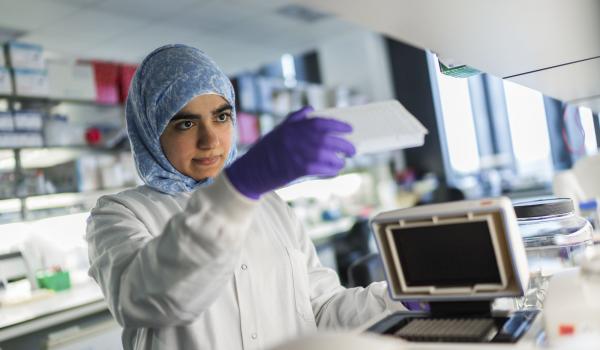A non-randomised, observational, biomarker study to determine the clinical value of measuring plasma Tie2 concentrations in patients with ovarian cancer who are receiving bevacizumab
Who can take part
Please note - unless we state otherwise in the summary, you need to talk to your doctor about joining a trial.
You may be able to take part in this clinical trial if you are:
-
age 16 years or over
-
diagnosed with ovarian cancer and meet one of the following criteria:
-
FIGO stage III with residual disease of more than 1cm; or stage IV
-
stage III at presentation treated with neoadjuvant chemotherapy
-
stage III and not able to have debulking surgery
-
-
planned to receive treatment with bevacizumab
-
willing to provide blood samples and comply with trial-specific procedures
This is not an exhaustive list. If you're interested in participating in a clinical trial, you should speak to your doctor about what other criteria might apply.
About the trial
In this study, researchers want to test a new blood test that they have developed which can tell doctors if a person is responding to the drug bevacizumab.
Bevacizumab is a type of targeted therapy that works by blocking a growth factor (like a hormone) that makes blood vessels. This growth factor is called VEGF. By blocking VEGF, some cancers in some patients can be starved of food and oxygen. This stops them growing back again. Bevacizumab is usually given in addition to chemotherapy drugs and then on its own as a maintenance treatment. It's available to women whose ovarian cancer diagnosis meets certain criteria.
Bevacizumab can have side effects for women receiving it and so it's important to know if it's working. The researchers conducting this study have developed a blood test that can tell doctors after a few weeks of starting treatment whether bevacizumab is effective for that person or not. They did this by measuring a protein in the blood called Tie2, in patients who were receiving bevacizumab for ovarian or bowel cancer.
Researchers now wish to develop the Tie2 test for use in the NHS. To do this they'd like to take extra blood samples from women who are going to have treatment with bevacizumab.
If you agree to take part in this study, you'll need to:
-
have your urine and blood pressure checked to make sure you are eligible for the trial.
-
agree to share your medical history with researchers.
-
donate additional blood samples (taken at the same time as routine samples) for research purposes.
The rest of your care will not be changed by taking part in the trial.



